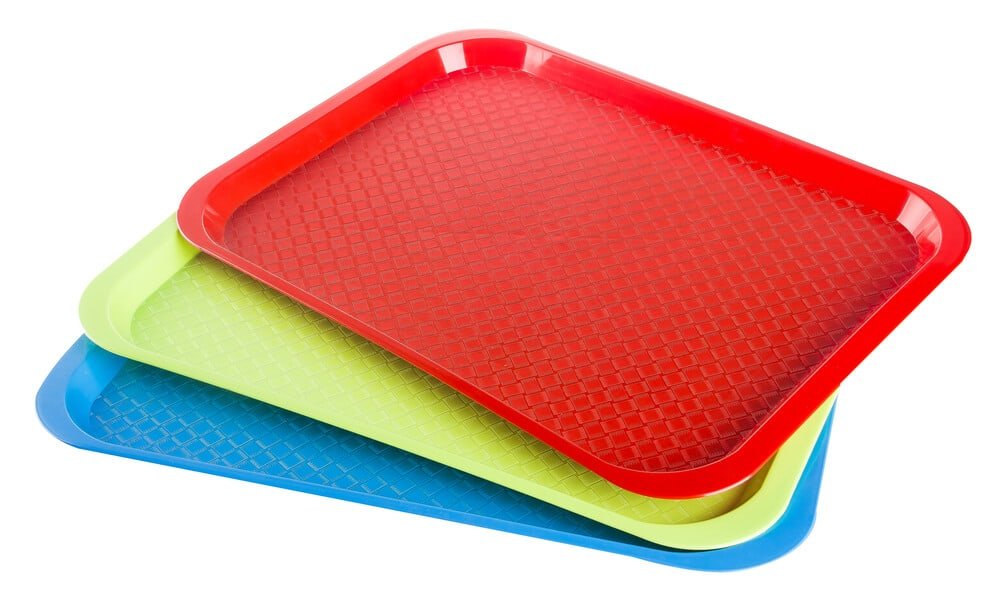Whether you have trays for takeout, containers from the store, or hard plastic food trays, you may have wondered if they can be recycled.
Most Plastics are recyclable. However, different towns, cities, regions, or countries have different rules. In some areas all plastics can go in a recycle bin.
In other areas they can only recycle some plastics.
Why are the Rules of Recycling Different?
Different types of plastic require slightly different processes for recycling.
Many times, this means that there need to be different recycling facilities.
Some areas do not have the money to fund recycling facilities fully. Instead, they focus on funding recycling for the most common and easy recyclables.
Some Plastics are harder to sort out, which is why they are generally considered unrecyclable.
These include small plastics (like bottle caps), plastic wrap, and plastic bags. They can be melted down so scientifically they can be recycled.
However, many areas can’t handle the recycling process because sorting is so hard.
In addition, there are plastics where the process of making them creates unbreakable bonds in the atoms. These plastics are not recyclable.
They cannot be melted down and reshaped.
Lastly, cleanliness of the plastic is key.
Dirty plastics are harder to recycle. Many places don’t offer recycling for items that people rarely clean out before tossing.
How to Tell if a Tray is Recyclable?
The first thing to do if you want to know if something is recyclable is look for the recycling triangle.
Check the number in the middle. In some places it doesn’t matter whether the number is a 1 or a 7, it will be recyclable.
However, in other places only some numbers are recyclable.
It is a good idea to look up what the rules are in your area.
That will allow you to sort recyclable items from non-recyclable items.
In general, 3s, 5s, and 7s are often not recyclable. These include plastic wrap, bubble wrap, luggage bags, car bumpers, acrylic plastics, and more.
1s and 2s are the most common and most easily recycled. 4s and 6s are recyclable in some areas but not in others.
The best option is to try and use fewer of the 3s-7s and more 1s and 2s.
Another option is for governments, corporations, scientists, and citizens to try and make better and more eco-friendly alternatives.
Are Disposable Trays Recyclable?
Disposable trays made from paper, cardboard, or other plant materials are often biodegradable.
If they are clean, they can be recycled. If they are not clean and have food scraps they may be sent to a commercial composter.
Some may even be able to be placed in your own compost bin.
Disposable trays made from aluminum can be recycled.
They need to be thoroughly cleaned out before they are recycled.
Styrofoam disposable trays are not recyclable.
They are also not Biodegradable and non-compostable.
Styrofoam lasts for 500 or more years in landfills before decomposing.
Plant-Based plastic trays may be biodegradable or compostable.
These products are new and are rarely recyclable as they need to be recycled separate from other plastics.
Can You Recycle Plastic Food Containers?
Many plastic food containers are recyclable.
However, even if they are recyclable where you live, they may not be recyclable in other areas.
- When traveling or moving, look up the recycling guideline for the areas you will be.
- When purchasing items, check for the recycling symbol.
- Try to avoid anything that uses materials you cannot recycle. If you cannot avoid them, then purchase and use as few as possible.
- After using a recyclable plastic, rinse the plastic well. You may even need to use soap and warm water.
- Once it is clean and dry, put the plastic in the recycle bin.
Are There Biodegradable Tray Options?
There are biodegradable tray and food container options.
They can be more expensive, but they are better for the environment.
Biodegradable trays and food containers are made out of plant materials. These materials include:
- Bagasse
- Bamboo
- Corn
- Grasses
- Recycled paper
- Leaves
Biodegradable trays and food containers that are more like cardboard or paper are better than plastic options.
Paper or cardboard plant-based trays and containers biodegrade quicker.
They are also often compostable, even in small at home composts.
Are There Compostable Tray Options?
Plant-based plastic biodegradable trays can be commercially compostable in some areas.
Whether a plant-based plastic tray or container is compostable will depend on the process used to make it and the available technologies in the area.
Plant-based paper or cardboard trays on the other hand are almost always compostable.
It is always best to check the ingredients and instructions to be sure.
However, it is common that these types of trays and food containers can be composted, not only commercially, but also in smaller, at home compost bins.


